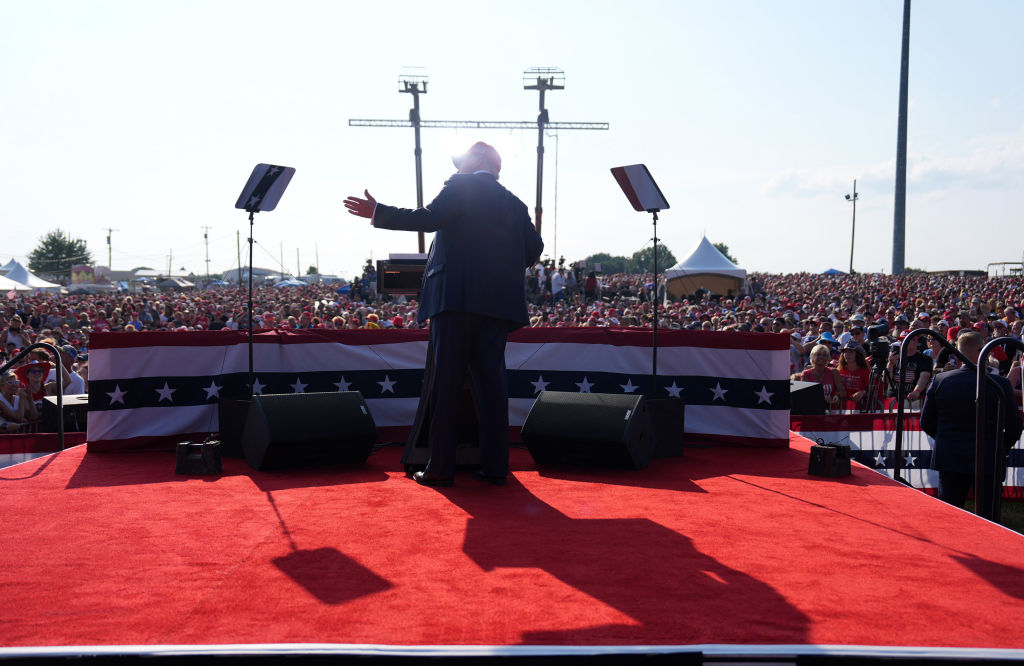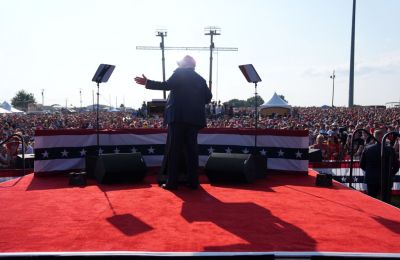God works in mysterious ways. Just a simple turn of the head saved Donald Trump from an assassin’s bullet—a fact that clearly impressed the former president.
Some of Trump’s critics like myself have been waiting for him to pivot—by shifting his appeals toward America’s median voter—since he wrapped up the GOP nomination in early 2016. He never has. But now, just as he’s about to be officially declared his party’s nominee once again, a pivot has preserved him. It has also given Trump a remarkable opportunity to reshape American politics.
If Trump wants a chance to win a landslide electoral college victory, he can embrace his moment. Without needing to repudiate his previous record—which seems hard to imagine—he can promise that the 47th president will be different than the 45th. And amazingly, this would be believable: If he wants to say that he is here only because of God’s grace, who can argue?
Trump no longer needs to define himself by his enmities. He can say that he has had a glimpse of what really matters—in part thanks to the heroic sacrifice of Corey Comperatore, the Buffalo Township, Pennsylvania firefighter who gave his life to shield his family from gunfire at Saturday’s rally. Trump can say that “Make America Great Again” has now taken on a new meaning for him, one far beyond partisanship. He can admit that forgiveness has not been his strength in the past but say that his goal now is to become the champion of every American who loves our country, even knowing that tens of millions of them voted against him before and will do so again.
Doing so would not require letting the contemporary Democratic Party or the left off the hook. Trump can say that their nominee is a decent man whose time has passed. He can say that Joe Biden’s party is too much in thrall to people who doubt America has ever been great and who fail to appreciate our country’s many virtues. Trump can even admit that he—a registered Democrat just two decades ago!—hopes that a thumping this fall will help the Democrats find their way back to serving regular American people, such that the 2028 election will give voters the chance to root for their guy without believing that the fate of the republic depends on victory.
Trump can stick with his signature issue of border security but focus on solving rather than prolonging its issues. He can say that the time has come for the next president to work with Congress to build the wall, fix the broken asylum system, deport criminal aliens, and find a way to make us once again a nation of laws, where all those who share this sacred land are on the right side of the law. In doing so, he can emphasize that he is not motivated by any hatred of immigrants, who are a great source of strength for the country, but by a conviction that we must be a nation of laws, in control of our own choices about who can become an American. Taking this line would put him in a position to make a grand bargain on immigration reform as Ronald Reagan, another survivor of an assassination attempt, once did. But whereas Reagan’s amnesty was paired with failed enforcement, Trump 47’s concessions (whatever they may be) will bring a genuine end to the waves of illegal immigration.
Setting potential doubts about this agenda aside, it would be wildly popular. Moreover, the political advantages Trump could gain right now by playing against type are remarkable. Consider inflation, perhaps the most important driver of pessimism in America today. A unity-driven Trump could say that he knows it’s not all Joe Biden’s fault; that countries around the globe have been struggling; that tightening our belts, rather than spending with reckless abandon, is the best means to stabilize prizes; and that the truth is that we’re going to all have to make some fiscal sacrifices (perhaps including letting some of the tax cuts of the 2017 Act expire).
Needless to say, such messages would be departures from Trump’s populist repertoire. Pivots would have been natural and helpful to the Trump of 2016, 2017, and 2020, but he instead maintained a posture as a provocateur of the establishment with the dogged persistence of a method actor. The former president has been something of an innovator in rejecting the idea of president-as-unifier, even in his rhetoric. Some of his most ardent supporters will feel betrayed if he reacts to the shooting with anything but redoubled calls for vengeance. Some will interpret the addition of J.D. Vance to the presidential ticket as evidence that Trump will be as combative as ever. (It should be noted, though, that during his time in the Senate, Vance was clearly committed to working with colleagues with whom he had major differences.) Grievance and giveaways remain the path of least resistance, most suited to the Trump we have come to know over the years.
But the turn envisioned here would instead, for the first time, see Trump seeking to become a great American leader. A leader genuinely focused on unity would, in the tradition of Lincoln, call forth the best in us, and ask us all to fight for a brighter future in which our pursuit of the good displaces our desire to see our political opponents ripped to shreds.
“God bless you, and God bless the United States of America!” is a cliché, one that most of us barely hear any more. How strange that Donald J. Trump has the chance to breathe new life into it this week due to the pivot of his head. Let us hope and pray that it was more than just a passing glance.






Please note that we at The Dispatch hold ourselves, our work, and our commenters to a higher standard than other places on the internet. We welcome comments that foster genuine debate or discussion—including comments critical of us or our work—but responses that include ad hominem attacks on fellow Dispatch members or are intended to stoke fear and anger may be moderated.
With your membership, you only have the ability to comment on The Morning Dispatch articles. Consider upgrading to join the conversation everywhere.